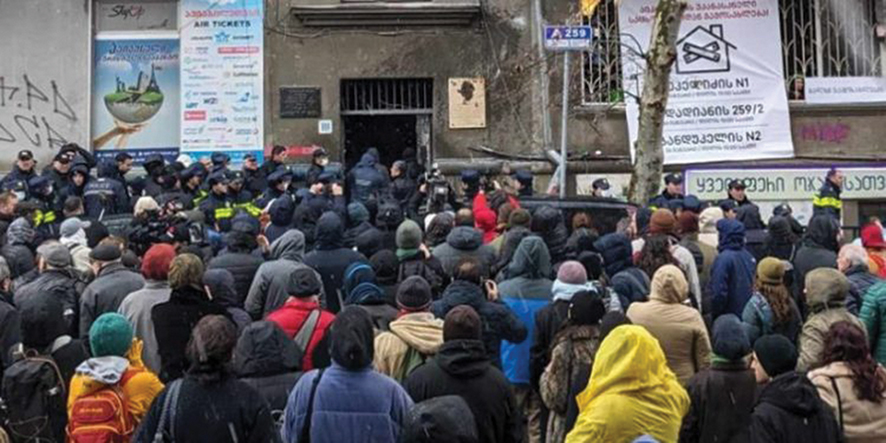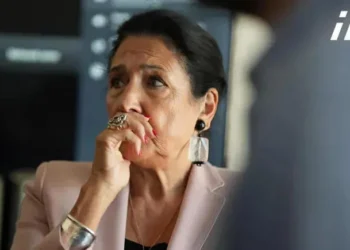On Kekelidze Street in Tbilisi, National Enforcement Bureau officers spent most of Tuesday trying to evict a family- the Khatiashvilis -from their place of residence.
The police sought to break down the entrance door but found it welded shut, as supporters and relatives mobilized near the house to prevent representatives of the National Bureau of Enforcement from evicting the family. Several people were detained, including activist Irakli Kakabadze and a number of journalists covering the event. One of the family members fainted during the eviction and had to be hospitalized.

The Khatiashvilis claimed they had already paid more than they borrowed to the private debtor demanding their removal, including additional interest, and told journalists they had no intention of giving up the apartment, however, the eviction was successfully concluded by 6pm.
Tbilisi Mayor Kakha Kaladze condemned the behavior of the protestors, stating that “Physical violence is wrong and categorically unacceptable, and such people who physically assault our employees while they are performing their duties must be punished. With the involvement of relevant agencies, we will act in accordance with the law.”
On January 24, an eviction procedure was planned on Shalva Dadiani Street, and on January 26 – on Zandukeli Street, but the National Enforcement Bureau said it was temporarily postponing the eviction of the Kakiashvili family on Dadiani Street in Tbilisi following the large-scale protests Tuesday, recognizing the fact that the family there is socially vulnerable and that two minors live in the house.
They noted that they would continue to communicate with the parties to reach an agreement.
“On the basis of Article 31 of the Law on Enforcement of Georgia, the National Bureau of Enforcement postponed the eviction, since the family is socially vulnerable and two minors live in this house.
“Considering their interests, they were given extra time to solve the issue. The Enforcement Bureau will continue to communicate with the parties in order to bring the case to a voluntary and amicable end,” the Bureau explained.
“Despite the decision, the citizens and family supporters gathered at the site say they are not going to disband. They think that delaying the eviction procedure means their victory and the government’s failure.”

One of the family members, Mariam Kakiashvili, stated that in 2014, she borrowed 5,000 dollars from a private moneylender, which she was unable to pay back, and finally, the apartment was sold at auction and bought by the private moneylender from whom she had borrowed the money.
Kakiashvili claims the seller asked her to pay approximately 20-25,000 dollars, and said that moving to rented accommodation is not a possibility for her. She also explains that she is a war veteran and mother of three, and lives in the house with her two minor children. She has asked to be given a reasonable deadline to be able to pay off her financial obligation.
Zurab Japaridze, Georgian politician and co-founder of Libertarian party Girchi – More Freedom, opined to journalists: “The debt needs to be paid in any case. Without any mechanism to force a person to pay, no one will pay a debt. The entire banking system and economy is based on this.”
The President of Georgia, Salome Zurabishvili, responded angrily to the evictions on social media: “Evicting people in winter is prohibited in all European countries! Human rights and European values are everything!” she wrote.
By Team GT














